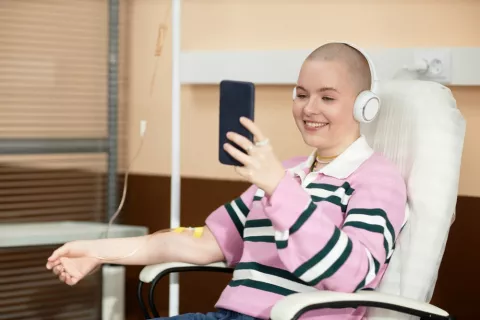Dr. Satish Rao, a researcher at the Medical College of Georgia, using the Vibrant vibrating capsule to treat constipation. (Michael Holahan/Augusta University)
A capsule that is administered orally and is programmed to vibrate for two hours twice a day can double the ability to defecate in adults with chronic constipation without the need to use other medications, as has been observed in a clinical trial in which they have More than 300 people participated in about 90 medical centers. The results show that participants who received the vibrating capsule for eight weeks had around twice as many complete spontaneous bowel movements as those who took a placebo.
The capsules are about 2.5 cm long, covered in latex-free plastic, and were taken by volunteers five days a week. These devices stimulated the colon for three seconds followed by 16 seconds of rest, and after completing the two daily sessions they quieted down and moved naturally through the gastrointestinal tract.
“First of all, it is a device, it is not a drug. It is a non-drug treatment, and secondly, it works directly in the colon, the target area, where it stimulates the muscles of the colon wall to do their job,” explained Dr. Satish SC Rao, director of neurogastroenterology and motility and the Digestive Health Clinical Research Center of the Medical College of Georgia and Augusta Health University, which led the study.
Almost 23% of those who took the active capsule had two or more complete spontaneous bowel movements per week compared to just under 12% of those who took the placebo
According to the researchers, 39% of the participants who used the vibrating pill had one or more complete bowel movements per week compared to 22% of those who received a placebo. Almost 23% of those who took the active capsule had two or more complete spontaneous bowel movements per week compared to just under 12% of those who took the placebo. The findings have been published in the journal Gastroenterology.
The capsule provided other benefits such as a significant improvement in constipation-associated problems such as straining to defecate and stool consistency, and although approximately 11% of those who took it said they had noticed a “mild vibrating sensation” they continued to use it. and no significant side effects were observed.
“The vibrating capsule is a novel, non-pharmacologic approach to the management of chronic constipation, a common and challenging problem throughout the world,” says Eamonn Quigley, MD, chief of gastroenterology and director of the Lynda K. and David M. Underwood Center. of Digestive Disorders at Houston Methodist Hospital and co-author of the paper. “These results demonstrate the safety and efficacy of the vibrating capsule in the treatment of chronic constipation.”
Activate the colon to solve constipation without taking drugs
When we eat food, it slides down the esophagus into the stomach where digestion begins, after which the largely liquid material passes into the small intestine where it is broken down for vitamins and nutrients to be absorbed, before reaching the colon. In the colon, and with the help of the bacteria it contains, water, electrolytes and vitamins from the food are absorbed and digested and the feces solidify before passing to the rectum to be eliminated.
If everything works normally, the colon constantly contracts to allow the movement of the contents, which is known as peristalsis and which should increase when food is actively processed. Therefore, direct stimulation of the colon is a possible strategy to combat constipation with fewer side effects.
“Constipation is a problem of the colon and we want to activate the organ that is not working properly,” says Rao. Currently, most drugs to treat constipation begin to work in the small intestine located between the stomach and the colon, which is an important place for digestion. The drugs increase secretions from the small intestine that flood the colon and this helps to evacuate its contents, but it is not just the waste that is flushed down the toilet.
“We are throwing away more than waste,” Rao warns, because this also removes much of the key gut microbiome, which is found primarily in the colon, where it supports digestion and plays a critical defense role for the immune system and helps our gut communicate with our brain. The damage to the gut microbiome that these types of therapies can cause is one of Rao’s biggest concerns. “The colon is a dynamic organ because there are a lot of bacteria there,” he points out, “and, like us, it needs adequate nutrition. According to the researcher, there is no evidence that the vibrating capsule interferes with the many essential functions of the intestinal microbiome.
The study included 269 women with chronic constipation. Of the total number of participants, 163 used the new vibrating capsule and 145 took a placebo capsule. Individuals in both groups had been battling constipation for an average of 14 years, although the problem tended to be more persistent in the group that received the vibrating capsule. They all took one capsule at bedtime five days a week for eight weeks so that the device would be in their colon when it was activated the next day.
Participants recorded their bowel movements and problems such as straining in electronic diaries and were allowed to resort to a limited number of “rescue” treatments such as laxatives if they did not have a bowel movement for three days, but also had to record such use in their diaries. Only “spontaneous” stools were taken into account, meaning that no salvage method was used in the previous 48 hours. An external activation capsule recorded the number and hours of activation of the vibrating capsule.
The study began with two different capsule activation times, 6 a.m. or noon, and evaluation of the first 120 patients showed that noon activation was giving better results, which surprised the researchers because the Most people tend to have a bowel movement in the morning, according to Rao, who has studied the unique biological rhythm of the colon for two decades.
This researcher has explained that one of the team’s next objectives is to personalize the use of the capsule and stresses that the fact that it is a programmable device means that, with the supervision and follow-up of a gastroenterologist, the time and duration of the treatment they could be modified and adapted for each individual, even to coincide with their usual meal schedule.
.















